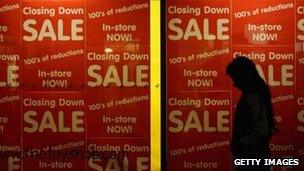UK economy 'to face bigger downturn'
- Published

Standard Chartered expects a recession in the UK in 2012
The UK economy is to contract by more than previously thought, according to a leading forecaster.
Economists at Standard Chartered bank said the economy will contract by 1.3% in 2012, having previously predicted growth of 0.6% for next year.
The eurozone economy will perform even worse, the bank forecast, contracting by 1.5%.
Meanwhile, the OECD economic think tank has predicted a slowdown for every major global economy in 2012.
The Organisation for Economic Co-operation and Development's December analysis of leading economic indicators suggested growth levels in the UK and the eurozone would fall below their long-term average.
Different forecasts
However, Standard Chartered's forecast for a contraction in the economy during 2012 is worse than most economists have predicted.
The Office for Budget Responsibility has said it expects the UK economy to grow by 0.9% in 2012.
And a survey of economic forecasts in November, carried out by the Treasury, suggested growth of between -0.4% and 2.3%.
However Standard Chartered said that "the mounting crisis" in advanced economies, especially the eurozone, has forced it to revise down its own forecasts.
"We think there will be a triple shock to the European economy," said Standard Chartered economist Thomas Costerg.
"[The] first being a confidence crisis, consumers spend less, businesses invest less. The second is that banks are tightening credit owing to the credit squeeze and the third is national governments tightening budgets all over Europe," he explained.
These shocks will cause a recession, not just in the eurozone but also in the UK, he explained.
Asian growth
However, while it expects European economies to contract, the bank predicted the world economy as a whole would grow by 2.2% next year.
The bank said that growth in Asia, where it does much of its business, would slow to 6.5% in 2012 from 7.3% in 2011, but would still be sufficient to enable the global economy to recover towards the end of the year.
"It will be a recovery made in the East and felt in the West. If ever one needed to illustrate the shift in the balance of power, this is it," said chief economist Gerard Lyons.